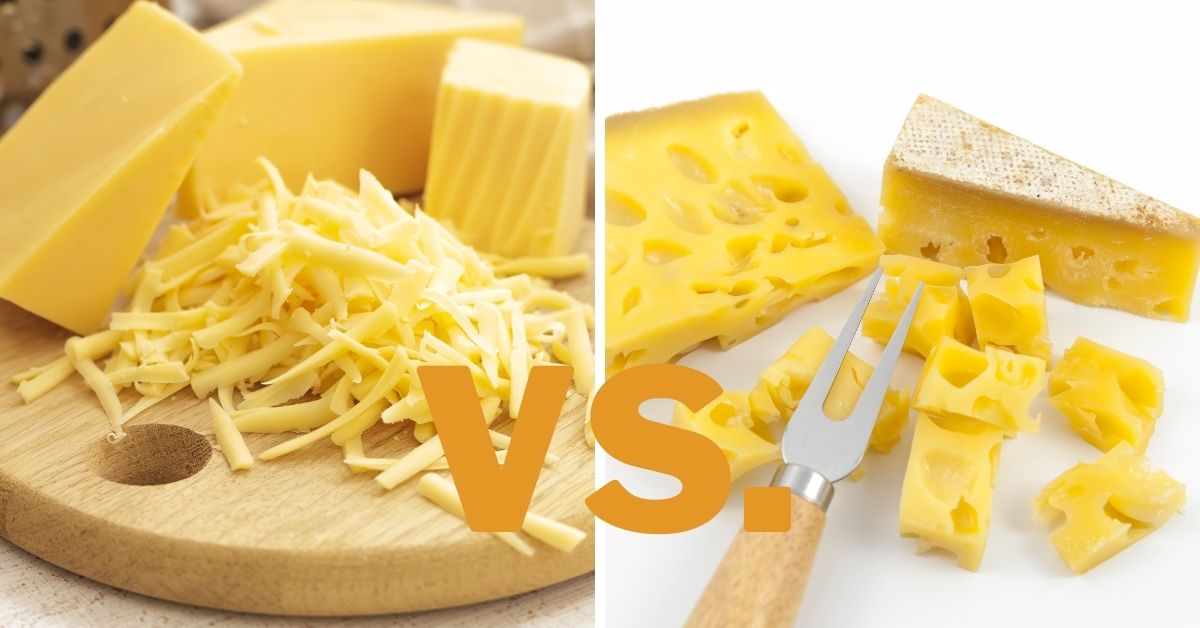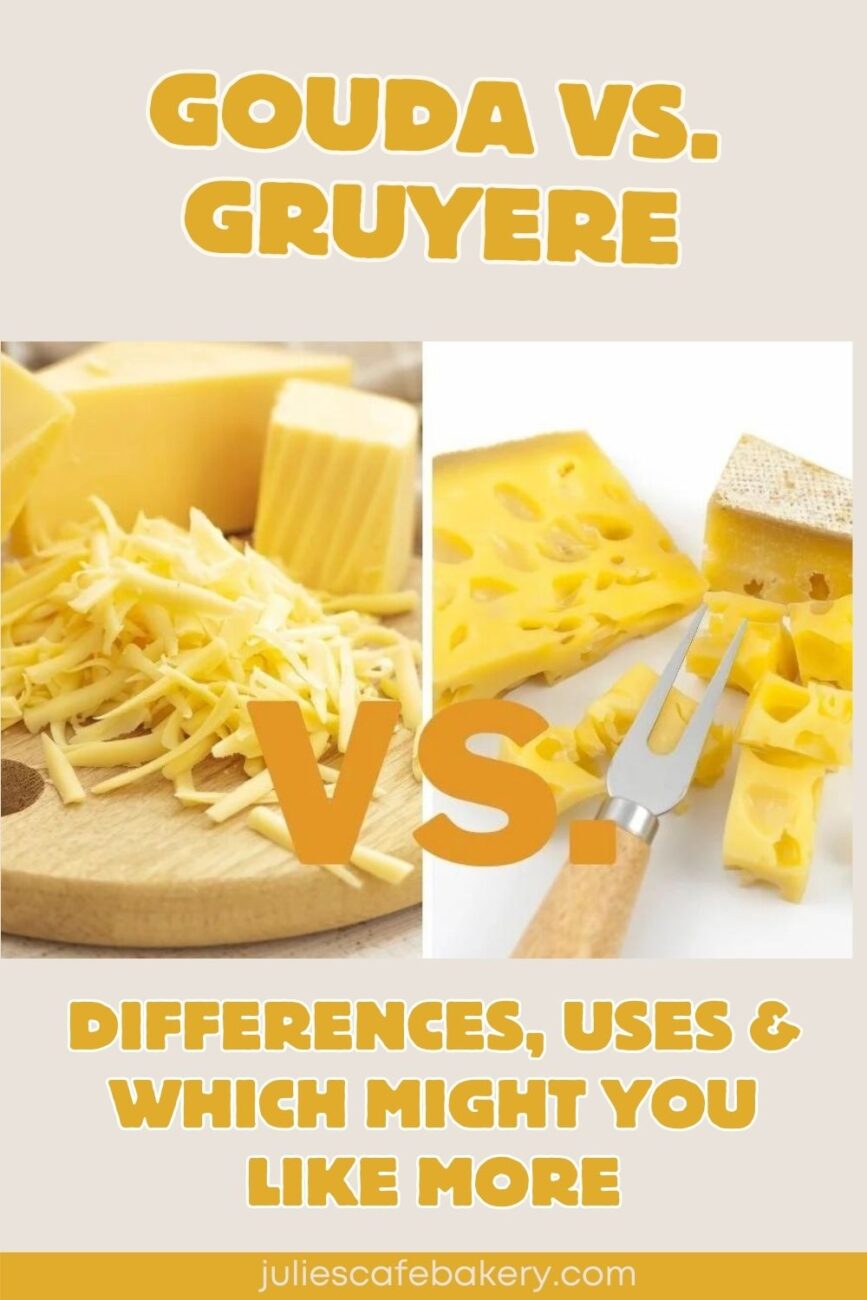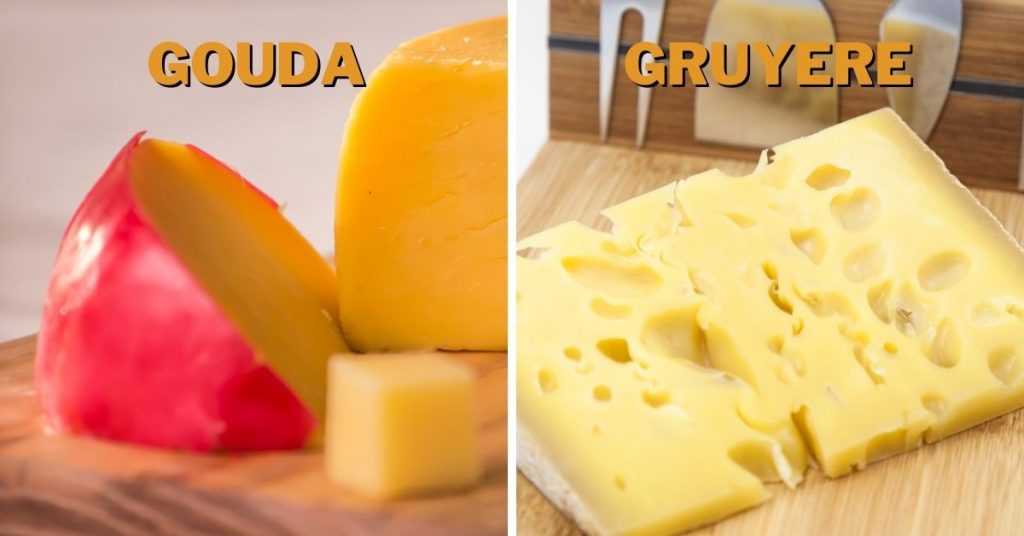Gouda vs. Gruyere: Differences, Uses & Which Might You Like More


Gouda and Gruyere are relatively similar types of cheese. It is usually very difficult to tell which is which. However, some people tend to be persistent in their choice of cheese, especially when combining cheese with other types of food or drinks. So, what are the differences between Gouda and Gruyere?
Gouda cheese has sweet and nutty flavors, but you can also feel fruity notes. Gruyere cheese is saltier and more bitter but contains fruity notes and sweetness. Gruyere’s nutty aftertaste lasts longer than Gouda’s. Also, Gruyere has a firmer texture than Gouda, while Gouda melts more easily.
Gruyere and Gouda come from different countries, but they are characterized by many similarities. These similarities often raise questions about the features and properties of both types, so people never know which one to choose. In this article, I have made a precise comparison of every detail related to Gouda and Gruyere so you can put an end to the debate between the two.
Differences between Gouda cheese and Gruyere
To understand the differences between Gouda and Gruyere, you must closely look into their properties and features. The differences that exist are subtle, and if you have tried both kinds of cheese, there is a chance that you have noticed only one or none of them. However, no matter how small they are, the differences still exist, and they change the combinations you do with them.
Below, you will learn everything about the differences between Gouda cheese and Gruyere, in terms of origin, taste, texture, production, color, and use.

Taste
For some people, it is difficult to distinguish between Gouda and Gruyere since they have similar flavors. However, if you try to taste the cheese cautiously, you will definitely notice different notes in the flavors of these two types of cheese.
Gouda is usually compared to Edam because of its sweet and fruity flavor. Since Gouda is semi-soft, it usually melts in your mouth, and the sweetness stays with you for a long time after eating. Its taste is mild and milky. On the other hand, Gruyere offers some slightly different tastes.
Namely, Gruyere also contains fruity and sweet flavors, but not as sweet as those in Gauda. Actually, some would say that Gruyere is salty and slightly bitter, and it has a nutty flavor at the end, which is really felt long after you ingest the cheese.
The older versions of Gruyere taste even creamier than the younger ones.
Texture
Gauda is a semi-hard cheese, meaning that its texture is not firm. However, it becomes harder and denser as the cheese ages. Another thing you can notice in aged Gauda versions is that they get crunchy due to calcium lactate crystals that form because of the reduced moisture in the cheese.
On the other hand, Gruyere has a firmer texture and a surface that is not entirely smooth. It is characterized by small holes due to the bubbles produced by natural bacteria, which are commonly added to cheese as part of the production process.

Ways of production
High-fat cow’s milk is the essential ingredient in making Gouda cheese. Although Gauda is produced in many places worldwide, it is a well-known fact that Holland has the best type of milk, so Gauda is delicious in the Dutch regions.
On the other hand, Gruyere is produced by using whole cow’s milk. Even though it is the same type of milk as in Gauda, the Swiss methods of making cheese are different. Also, the other ingredients that are used in the production are not the same as in Holland, meaning that it is logical that these two types of cheese will have differences in flavors and tastes.
Uses
Gauda is one of the most used types of cheese worldwide, mainly because it is significantly versatile. In other words, Gauda goes well with many dishes, meaning that it can be easily combined with other types of food. Another great feature of Gauda is that it melts easily.
On the other hand, Gruyere is a very popular ingredient in French onion soup. It is also a great topping for French toast and a table cheese option. So, it can be said that Gruyere is equally versatile as Gauda.

Color
Gauda cheese comes in a pale ivory color. This is the usual color of this type of cheese, but you can also see some Gauda variations that come in a yellow-orange combination.
On the other hand, Gruyere comes only in the pale ivory color.
Gouda or Gruyere: Which might you like more?
This question usually has no right or wrong answer since it depends on your taste. They are usually interchangeable, so you can use them in many dishes.
On the other hand, if you are looking for a specific taste and texture, you will probably need to choose the one that best suits your preferences. If you want cheese with a stronger taste, opt for Gruyere. If you like a mild kind of cheese, choose Gouda.
Can you use Gouda instead of Gruyere?
If Gruyere is unavailable, you might opt for Gauda. They share many properties and features, meaning that Gauda will be a good substitute for Gruyere. However, you should expect slight changes in the taste since Gouda is slightly sweeter than Gruyere.
What kind of cheese is closest to Gruyere?
If you can’t find Gruyere, you can always rely on a substitute. Some good cheese options that are close to Gruyere’s features are Emmental, Jarlsberg, and Raclette. These kinds of cheese are good replacements since they have similar properties, and you will not notice many changes in the taste.
What cheese is comparable to Gouda?
When it comes to texture and properties, many types of cheese are similar to Gouda. For instance, Edam, Munster, Monterey Jack, Havarti, and Cheddar are very suitable substitutes for Gouda. You will be able to enjoy a similar, delicious taste of Gouda, although you might notice some slight changes in your dishes in terms of flavors.
Obviously, Gouda cheese and Gruyere share many similarities, but it is always important to know all of their features. The differences between them might not be very significant when picking out a type of cheese for a cheese plate, but when it comes to cooking different dishes, you might have to think twice.
